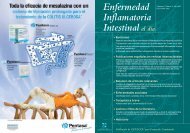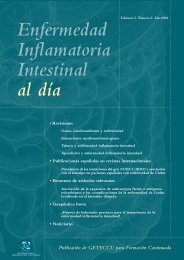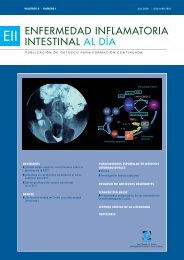Número 1 - EII al dÃa
Número 1 - EII al dÃa
Número 1 - EII al dÃa
Create successful ePaper yourself
Turn your PDF publications into a flip-book with our unique Google optimized e-Paper software.
a pesar de que la incidencia de <strong>EII</strong> en gener<strong>al</strong> y de CU en<br />
particular crece, cada vez se indican menos cirugías.<br />
El motivo fundament<strong>al</strong> que nos empuja a expandir el arsen<strong>al</strong><br />
médico es que la <strong>al</strong>ternativa quirúrgica del reservorio<br />
íleo-an<strong>al</strong>, necesaria a veces, no es demasiado buena,<br />
fundament<strong>al</strong>mente por su <strong>al</strong>ta tasa de complicaciones<br />
(hasta un 50% en 10 años (22) , que pueden ser graves e implicar<br />
un f<strong>al</strong>lo del reservorio, o no tan graves pero empobrecedoras<br />
de la c<strong>al</strong>idad de vida, como la disfunción sexu<strong>al</strong>,<br />
la pérdida de fertilidad o de la continencia, siendo<br />
el princip<strong>al</strong> cab<strong>al</strong>lo de bat<strong>al</strong>la la reservoritis, que afecta<br />
hasta un 60% de los pacientes y se cronifica en aproximadamente<br />
un 10% (23) . Fin<strong>al</strong>mente, otros argumentos que<br />
justificaban la actitud quirúrgica, como la c<strong>al</strong>idad de vida<br />
y el riesgo de cáncer, comienzan a tamb<strong>al</strong>earse, ya que la<br />
primera es difícil de ev<strong>al</strong>uar (24,25) y se han descrito casos de<br />
cáncer en la mucosa remanente de pacientes con reservorio<br />
(26) . Así, de acuerdo con una reciente revisión sistemática<br />
acerca de la c<strong>al</strong>idad de vida en pacientes con reservorio<br />
íleo-an<strong>al</strong>, parece claro que ésta no puede ser considerada<br />
“norm<strong>al</strong>” y que se debe recurrir a la <strong>al</strong>ternativa<br />
quirúrgica tan solo en ausencia de otras <strong>al</strong>ternativas (25) , entre<br />
las cu<strong>al</strong>es deberíamos, probablemente, incluir el MTX.<br />
¿Podría el MTX tener otra utilidad<br />
para los pacientes con CU?<br />
Los tratamientos biológicos han irrumpido en la<br />
CU y nos vemos obligados a aprovechar la experiencia<br />
que hemos acumulado con ellos en la EC.<br />
En este sentido, parece claro que la optimización<br />
del tratamiento con infliximab pasa por la inmunosupresión<br />
concomitante, ya sea con agentes tiopurínicos<br />
o con MTX (27) , de hecho, la experiencia<br />
con tratamiento combinado de infliximab y MTX<br />
en reumatología es enormemente favorable. Así<br />
pues, cabe pensar que si ya empezamos a hablar<br />
de infliximab en CU, probablemente en un futuro<br />
próximo estemos hablando de infliximab y MTX en<br />
la CU.<br />
Conclusiones<br />
Aunque no existe evidencia cierta de la utilidad del<br />
MTX en la CU, hay suficientes datos en la literatura<br />
para suponer lo contrario, lo que nos lleva a pensar<br />
que es posible que se hubieran obtenido otros<br />
resultados en los estudios controlados si se hubiera<br />
ensayado la dosis y la vía de administración adecuadas.<br />
Así pues, debemos continuar los esfuerzos por<br />
ampliar el arsen<strong>al</strong> farmacológico para la CU, incluyendo<br />
probablemente <strong>al</strong> MTX, y restringir progresivamente<br />
las indicaciones de cirugía.<br />
Por otro lado, el MTX puede ser de utilidad además como<br />
tratamiento inmunosupresor coadyuvante a los nuevos<br />
tratamientos biológicos.<br />
En definitiva, todavía es pronto para enterrar <strong>al</strong> MTX<br />
en la CU.<br />
BIBLIOGRAFÍA<br />
1. Rampton DS. Methotrexate in Crohn’s disease. Gut 2001; 48: 790-791.<br />
2. Kozarek RA, Patterson DJ, Gelfand MD, Botoman VA, B<strong>al</strong>l TJ, Wilske<br />
KR. Methotrexate induces clinic<strong>al</strong> and histologic remission in patients<br />
with refractory inflammatory bowel disease. Ann Intern Med 1989;<br />
110: 353-6.<br />
3. Baron TH, Truss CD, Elson CO. Low-dose or<strong>al</strong> methotrexate in refractory<br />
inflammatory bowel disease. Dig Dis Sci 1993; 38: 1851-6.<br />
4. Feagan BG, Rochon J, Fedorak RN, Irvine EJ, Wild G, Sutherland L, Steinhart<br />
AH, Greenberg GR, Gillies R, Hopkins M, et <strong>al</strong>. Methotrexate for the<br />
treatment of Crohn’s disease. The North American Crohn’s Study Group<br />
Investigators. N Engl J Med 1995; 332: 292-7.<br />
5. Feagan BG, Fedorak RN, Irvine EJ, Wild G, Sutherland L, Steinhart AH,<br />
Greenberg GR, Kov<strong>al</strong> J, Wong CJ, Hopkins M, Hanauer SB, McDon<strong>al</strong>d JW.<br />
A comparison of methotrexate with placebo for the maintenance of remission<br />
in Crohn’s disease. North American Crohn’s Study Group Investigators.<br />
N Engl J Med 2000; 342: 1627-32.<br />
6. Oren R, Arber N, Odes S, Moshkowitz M, Keter D, Pomeranz I, Ron Y,<br />
Reisfeld I, Broide E, Lavy A, Fich A, Eliakim R, Patz J, Bardan E, Villa Y, Gilat<br />
T. Methotrexate in chronic active ulcerative colitis: a double-blind, randomized,<br />
Israeli multicenter tri<strong>al</strong>. Gastroenterology 1996; 110: 1416-21.<br />
7. Mate-Jimenez J, Hermida C, Cantero-Perona J, Moreno-Otero R. 6-mercaptopurine<br />
or methotrexate added to prednisone induces and maintains<br />
remission in steroid-dependent inflammatory bowel disease. Eur J Gastroenterol<br />
Hepatol 2000; 12: 1227-33.<br />
8. Meuwissen SG, Ewe K, Gassull MA, Geboes K, Jewell D, P<strong>al</strong>lone F,<br />
Rachmilewitz D, Rask-Madsen J, Riddell BH, Sandborn BJ, Schmuck<br />
ML. IOIBD questionnaire on the clinic<strong>al</strong> use of azathioprine, 6-mercaptopurine,<br />
cyclosporin A and methotrexate in the treatment of inflammatory<br />
bowel diseases. Eur J Gastroenterol Hepatol 2000; 12:<br />
13-8.<br />
9. Caprilli R, Angelucci E, Cocco A, Viscido A, Annese V, Ardizzone S, Biancone<br />
L, Castiglione F, Cottone M, Meucci G, Paoluzi P, Papi C, Sturniolo<br />
GC, Vecchi M. Appropriateness of immunosuppressive drugs in inflammatory<br />
bowel diseases assessed by RAND method: It<strong>al</strong>ian Group for IBD<br />
(IG-IBD) position statement. Dig Liver Dis 2005; 37: 407-17.<br />
10. Beaugerie L, Carrat F, Bouvier AM, Brousse N, Carbonnel F, Colombel JF,<br />
Faivre J, J.F. F, Maynadie M, Dupas JL, Gendre JP, Godeberge P, Hugot JP,<br />
Lemann M, Nahon S, Sabate JM, Tucat G. The use of immunomodulators<br />
and bologics in inflammatory bowel disease (IBD): a cross-section<strong>al</strong> French<br />
nationwide cohort 2004-2005. Gastroenterology 2006; 130 (suppl 2):<br />
W1163.<br />
11. Carter MJ, Lobo AJ, Travis SP. Guidelines for the management of inflammatory<br />
bowel disease in adults. Gut 2004; 53 Suppl 5: V1-16.<br />
12. Oren R, Moshkowitz M, Odes S, Becker S, Keter D, Pomeranz I, Shirin<br />
C, Reisfeld I, Broide E, Lavy A, Fich A, Eliakim R, Patz J, Villa Y, Arber<br />
N, Gilat T. Methotrexate in chronic active Crohn’s disease: a doubleblind,<br />
randomized, Israeli multicenter tri<strong>al</strong>. Am J Gastroenterol 1997;<br />
92: 2203-9.<br />
13. Arora S, Katkov W, Cooley J, Kemp JA, Johnston DE, Schapiro RH, Podolsky<br />
D. Methotrexate in Crohn’s disease: results of a randomized, double-blind,<br />
placebo-controlled tri<strong>al</strong>. Hepatogastroenterology 1999; 46:<br />
1724-9.<br />
26 • Enfermedad Inflamatoria Intestin<strong>al</strong> <strong>al</strong> día - Vol. 6 - Nº. 1 - 2007











